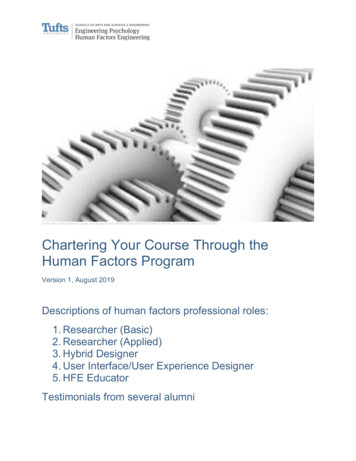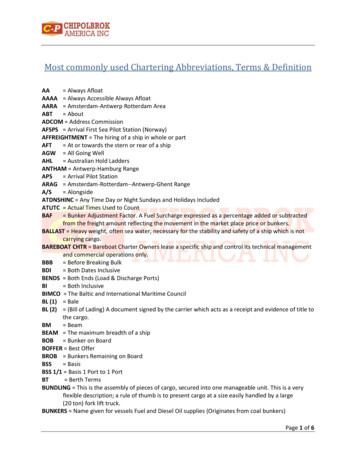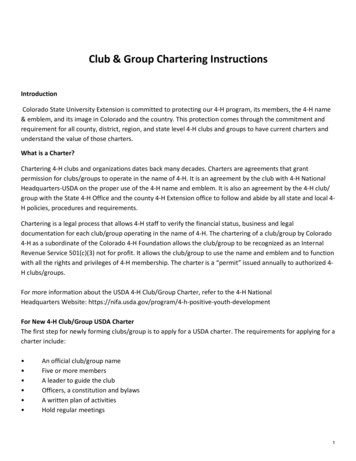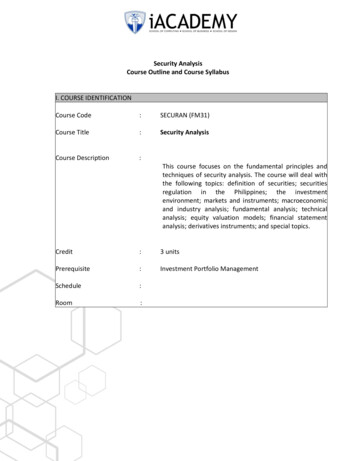
Transcription
Credit: https://encrypted-tbn0.gstatic.com/images?q tbn:ANd9GcQn4IgDMfZJEGKZOeK7XQPFX4d DnMP3Cf32UymsC3YSQAlXOiBigChartering Your Course Through theHuman Factors ProgramVersion 1, August 2019Descriptions of human factors professional roles:1. Researcher (Basic)2. Researcher (Applied)3. Hybrid Designer4. User Interface/User Experience Designer5. HFE EducatorTestimonials from several alumni
Descriptions of human factorsprofessional roles
1. User Researcher (Basic)RoleA human factors professional who conducts basic user research usually seeks to expand knowledgeabout how people think and behave either fundamentally or in a particular context. For example, a basicuser researcher might study how people work independently or in teams; a study of a person’s ability tomulti-task could someday be applied in the development of an aircraft cockpit. As such, this type ofprofessional is conducting work that had considerable overlap with individuals conducting basicpsychological research, the difference being that the research results are likely to guide product andsystem development efforts. Research activities include such tasks as conducting literature searches toassemble human factors knowledge on selected topics, conducting field observations to understanddeeply how people interact within existing systems and products, and conducting lab-based studies ofhow people perform such tasks as acquiring information, reaching decisions, formulating action plans,and taking action. The research results might be disseminated through technical papers, journal articles,and conference presentations, or they might be kept private by a corporation that considers theinformation to be proprietary and of competitive benefit. Research might be funded by a corporationinterested in such as topics as how people will function in a semi-autonomous system (partially selfdriving cars in public). Or, such research might be sponsored by a governmental agency such as the USDepartments of Transportation’s Federal Highway Administration, with its logical interest in the sametopic: semi-autonomous driving. In the first case, the end-goal might be to draw upon the research resultsto inform autonomous driving systems development efforts. In the second case, the end-goal might be todraw upon research results to establish government policy and regulatory requirements pertaining toautonomous driving systems.Work activities and productsConduct eye trackingstudyConduct driving studyConduct haptics studyConduct medical errorstudyConduct militarysystems studyConduct pilotperformance studyConduct augmentedreality studyWrite technical paperon use errors
Important knowledge and skills Anatomy and physiologyData visualizationExperimental designHuman behaviorHuman cognitionHuman subjects protection Individual interviewingKinesiologyLinear programmingPerceptionPerformance assessmentPublic presentations Statistical analysisTask analysisTeamworkWorkload measurementWritingSample courseworkFreshman – Fall SemesterFreshman – Spring Semester EN 1: Applications in EngineeringENG 1: Expository WritingMATH 32: Calculus IPHY 11: General Physics I ENP 64: Methods for Human FactorsEngineeringES 2: Introduction to Computing inEngineeringMATH 34: Calculus IIPSY 1: Introduction to PsychologyFree ElectiveSophomore – Fall SemesterSophomore – Spring Semester COMP 11: Introduction to Computer ScienceES 3: Introduction to Electrical Systems ORME 30: Electromechanical Systems &Robotics I OR ES 5: Introduction toMechanical Statics and Dynamics OR ME 20:Mechanics IPSY 31: Statistics for Behavioral Science ORES 56: Probability and StatisticsENP 53: Engineering PsychologyHASS ElectiveJunior – Fall Semester COMP 15: Data Structures OR COMP 20:Web ProgrammingPSY 32: Experimental PsychologyRecommended PSY ElectiveENP 130: Advanced Engineering PsychologyNatural Science ElectiveMathematics ElectiveJunior – Spring Semester EM 52: Technical and ManagerialCommunicationPSY 207: Advanced Statistics IRecommended PSY ElectiveDomain Focus ElectiveDomain Focus ElectiveNatural Science Elective COMP 171: Human-Computer InteractionOR ENP 166: Computer Interface DesignENP 161: Human Factors in ProductDesignDomain focus electiveES 18: Computer Aided Design w/ LabOR ME 40: Engineering Design ICOMP Elective OR ENP Core ElectiveSenior – Fall SemesterSenior – Spring Semester ENP 120: Senior CapstoneENP 163: Analytical Methods in HumanFactors Engineering Recommended ENPCore ElectiveDomain Focus ElectiveFree ElectiveHASS Elective ENP 120: Senior CapstoneEngineering ElectiveENP 164: Applied Behavior Statistics forEngineering Recommended ENP OpenElectiveDomain Focus ElectiveHASS Elective
Courses of potential interest ANTH 0010: Introduction to Sociocultural Anthropology (HASS/HASS Social Sciences OR DomainFocus)ANTH 0032: Introduction to the Anthropology of Science and Technology (HASS/HASS SocialSciences OR Domain Focus)ANTH 0136: Cultures of Computing (HASS/HASS Social Sciences OR Domain Focus)BIO 0049: Experiment in Physiology (Natural Science OR Domain Focus)BIO 0134: Neurobiology (Natural Science OR Domain Focus)BME 0143: Biological Systems Analysis (Engineering OR Domain Focus)CSHD 0001: Child Study and Human Development (HASS/HASS Social Sciences OR DomainFocus)CSHD 0042: Inquiry and Analysis in Child Study and Human Development (HASS/HASS SocialSciences OR Domain Focus)COMP 0013: How Systems Work (COMP)COMP 0020: Web Programming (COMP OR Engineering)COMP 0061: Discrete Mathematics (Mathematics OR COMP OR Domain Focus)COMP 0135: Intro Machine Learning (Mathematics OR COMP OR Domain Focus)COMP 0177: Visualization (COMP)EM 0051: Engineering Management (Domain Focus OR Engineering)EM 0054: Engineering Leadership (Domain Focus)EM 0153: Innovation Management (Domain Focus)ENP 0099: Internship in Psychology (Engineering)LING 0015: Introduction to Linguistics (HASS/HASS Social Sciences OR Domain Focus)LING 0033: Logic (HASS/HASS Social Sciences OR Domain Focus)OTS 0104: Kinesiology (HASS/HASS Social Sciences OR Domain Focus)PSY 0009: Introduction to Cognitive & Brain Sciences (HASS/HASS Social Sciences OR DomainFocus)PSY 0028: Cognitive Psychology (HASS/HASS Social Sciences OR Domain Focus OR PSY)PSY 0029: Human Neuropsychology (HASS/HASS Social Sciences OR Domain Focus OR PSY)PSY 0041: Perception/Cognition Laboratory HASS/HASS Social Sciences OR Domain Focus ORPSY)PSY 0140: Mathematical Psychology (HASS/HASS Social Sciences OR Domain Focus OR PSY)PSY 0144: Memory and Retention (HASS/HASS Social Sciences OR Domain Focus OR PSY)PSY 0147: Multitasking (HASS/HASS Social Sciences OR Domain Focus OR PSY)PSY 0208: Advanced Statistics II (HASS/HASS Social Sciences OR Domain Focus OR PSY)SOC 0100: Research Design and Interpretation (HASS/HASS Social Sciences OR Domain Focus)Enrichment options Summer internship following Junior Year; Fall internship during Senior year, Fall and/or SpringSemesters.Research with professors in the Human Factors Department, Psychology Department, or otherdepartment of interest.Independent study on human factors research topic of particular interest.Attend/contribute to Human Factors and Ergonomics Society (HFES) meetings and conferences(national and local events) as a student.
2. User Researcher (Applied)RoleA human factors professional who conducts applied user research is often engaged in a system orproduct development effort. The team’s end-goal might be to create software, hardware, or hybrid systemor product, such as a mobile application for a smart phone, a power tool, or an automobile.Research activities include such tasks as conducting literature searches to assemble human factorsknowledge that pertains to a user interface development effort, conducting field observations tounderstand better how people interact with existing systems and products, conducting interviews withindividuals and groups of people to gain deeper insight into their needs and preferences, and conductingvarious types of user interface design assessments such as usability tests.While the applied researcher might not serve as a user interface designer per se, s/he can still play animportant role in shaping design solutions. For example, s/he might develop user interface specificationbased on research results, contribute to high-level conceptual design studies, and developrecommendations for design improvement based on usability test results.Work activities and productsConduct field researchon exoskeletonsInterview consumersabout productpreferencesPerform task analysisPerform risk analysisConduct usability testof websiteConduct literaturesearch on effects ofagingConduct workflowanalysisConduct workflowanalysisImportant knowledge and skills Cognitive walkthroughsInternational cultural normsData visualizationExperimental designField observationGroup interviewingHuman behavior Human cognitionHuman subjects protectionIndividual interviewingJourney mappingMotivationPerformance assessmentProject management Statistical analysisStory tellingTask analysisTeamworkUsability testingWorkload analysisWriting and presenting
Sample courseworkFall SemesterFreshman Year PSY 1: Intro to Psychology (also countstowards LA-Distribution-Social Sciences) COMP 11: Intro Computer Science (alsocounts towards LA-Distribution-Mathematics)Sophomore Year ENP 64: Methods for Human FactorsEngineering (Fall Only) PSY 31: Statistics for the Behavioral SciencesJunior Year ENP 53: Engineering Psychology (Fall Only) EM 52: Technical and ManagerialCommunication ES 18: Computer Aided Design w/ Lab DRWM24: Intro Drawing (also counts towardsLA-Distribution-Arts)Spring Semester COMP 15: Data Structures (also countstowards LA-Distribution-Mathematics) PSY 32: Experimental PsychologyME 1: Mechanical Design and Fabrication(Spring Only) PSY 130 - Advanced Engineering Psychology(Spring Only)ENP 166: Computer Interface Design (SpringOnly)ENP 161: Human Factors in Product Design(Spring Only)EM51: Engineering ManagementDRWM63: Perspective Drawing (also countstowards LA-Distribution-Arts; Spring Only) Senior Year ENP120: Product Study in Human Systems ENP120: Product Study in Human Systems(full year)(full year) ENP105: Assistive Technology (OR other ENP165: Industrial Design (Spring Only)PSY/ENP elective; Fall Only) ENP163: Analytic Methods in Human Factors ENP164: Applied Behavioral Statistics in(Spring Only)Engineering (Fall Only)Courses of potential interest ENP162: Human-Machine System Design PSY 28: Cognitive Psychology (also counts towards LA-Distribution-Social Sciences) PSY 9: Intro to Cognitive and Brain Science (also counts towards LA-Distribution-Social SciencesOR LA-Distribution-Natural Sciences) PSY 11: Developmental Psychology (also counts towards LA-Distribution-Social Sciences) CSHD 01: Child Study and Human Development (also counts towards LA-Distribution-SocialSciences) COMP 20: Web Programming (also counts towards LA-Distribution-Mathematics) COMP 171: Human-Computer Interaction COMP 177: Visualization EM 54: Engineering Leadership EM 153: Innovation Management LING 15: Introduction to Linguistics PSY 144: Memory and Retention PSY 207: Advanced Statistics I PSY 41: Perception/Cognition Laboratory ANTH 24: Anthropology of Environment ANTH 32: Introduction to the Anthropology of Science and TechnologyEnrichment options Summer internship following Sophomore and Junior Year; part-time Fall internship during Senioryear, Fall and/or Spring Semesters.
Applied research coursework (transferable) at other academic institution (e.g., Harvard,Northeastern, and multiple distance learning programs) offering design-related courses.Independent study on human factors research topic of particular interest.Attend/contribute to User Experience Professionals Association (UXPA), Human Factors andErgonomics (HFES), and Special interest Group of the Automated Computing Machines (SIGCHI)meetings and conferences (national and local events) as a student.
3. Hybrid DesignerUser Interface (UI) / User Experience (UX) / Industrial Design (ID)RoleThe User Interface (UI)/ User Experience (UX)/ Industrial Design (ID) hybrid role suits an individual whosees herself/himself as a “creative” who welcomes a wide variety of design challenges and is prepared todevelop an equally wide array of knowledge and skill. The hybrid path suits individuals who might be tornbetween pursuing a degree in human factors versus user interface, industrial design, but ultimately seesvalue in treating human factors as their core competencies. This hybrid is likely to begin her/his career ina startup or small company that sees value in hiring one person who can wear a UI/UX/ID “hat.” This canput such an individual under some pressure to perform all related tasks effectively, at least to thestandard of other professionals who focused on one area, such as human factors or industrial design.Beware that many hybrids will choose to focus in one area (e.g., UI design) during their undergraduatecareer and then a second area (e.g., Industrial design) during their graduate career. Generally, anindividual with a B.S. degree in one of these fields and an M.S. degree in the other is a highly valuedindividual; perhaps more than someone who tried to cover both topics in the course of theirundergraduate studies. However, the hybrid might not be called upon to “do it all.” Rather s/he might beasked to “drive” the UI/UX/ID aspects of a product design process, depending to some degree on othercontributors, such as retained consultants. Many hybrids will ultimately rise in product developmentorganizations to manage UI/UX/ID departments that concentrate on producing use-centered designsolutions that must be safe, effective, usable, and satisfying to the intended users. Typical employersinclude product development consultancies and central design departments within manufacturingcompanies. The UI/UX/ID hybrid should graduate college with a deep understanding of design from auser interaction, functional, and aesthetic standpoint. For example, s/he should be able to assume asignificant role in designing products such as a dental chair, wearable fitness monitor (e.g., Fitbit),Internet-enabled refrigerator, automobile infotainment system, prosthetic arm, and motorcycle helmet.Work activities and productsDesign EKG watchuser interfaceConduct usability testof kitchen applianceConduct usability testof mobile appConceptual design orergonomic wheelchairEvaluate performanceof a medicalexoskeletonCritique the design ofcontrols of a tractorCollect user feedbackon camera userinterfaceDevelop instructions foruse for stroller
Important knowledge and skills AnimationBrandingColor theoryCompositionComputer-aided-design(solid modeling)Conceptual modelingDesign historyDesign languageDesign studio Emotional designErgonomicsForm/sculptureGraphic designIndustrial designManufacturing/fabricationmethodsMaterials engineeringProject managementPrototyping TypographyUser interface designmethodsUser interface designprinciplesUser interface structuresValue engineeringWeb design3-D PrototypingSample courseworkFreshman – Fall SemesterFreshman – Spring Semester EN 1: Applications in EngineeringENG 1: Expository WritingMATH 32: Calculus IPHY 11: General Physics I ENP 64: Methods for Human FactorsEngineeringES 2: Introduction to Computing inEngineeringMATH 34: Calculus IIPSY 1: Introduction to PsychologyFree ElectiveSophomore – Fall SemesterSophomore – Spring Semester COMP 11: Introduction to Computer ScienceES 3: Introduction to Electrical Systems ORME 30: Electromechanical Systems &Robotics I OR ES 5: Introduction toMechanical Statics and Dynamics OR ME 20:Mechanics IPSY 31: Statistics for Behavioral Science ORES 56: Probability and StatisticsENP 53: Engineering PsychologyHASS Elective COMP 15: Data Structures OR COMP 20:Web ProgrammingPSY 17 - Industrial and OrganizationalPsychology Recommended PSY ElectiveENP 130: Advanced Engineering PsychologyNatural Science ElectiveMathematics ElectiveJunior – Fall SemesterJunior – Spring Semester EM 52: Technical and ManagerialCommunicationPSY 13 - Social Psychology RecommendedPSY ElectiveDomain Focus ElectiveDomain Focus ElectiveNatural Science ElectiveENP 166: Computer Interface DesignENP 161: Human Factors in Product DesignDomain focus electiveES 18: Computer Aided Design w/ LabCOMP Elective OR ENP Core ElectiveSenior – Fall SemesterSenior – Spring Semester ENP 120: Senior CapstoneENP 120: Senior CapstoneEngineering Elective
ENP 162 - Human-machine System DesignRecommended ENP Core ElectiveDomain Focus ElectiveFree ElectiveHASS Elective ENP 165 - Industrial Design RecommendedENP Open ElectiveDomain Focus ElectiveHASS ElectiveCourses of potential interest COMP 13: How Systems Work (COMP)COMP 20: Web Programming (COMP OR Engineering)COMP 61: Discrete Mathematics (Mathematics OR COMP OR Domain Focus)COMP 135: Intro Machine Learning (Mathematics OR COMP OR Domain Focus)COMP 175: Computer Graphics (COMP)COMP 177: Visualization (COMP)COMP 272: User Interface Software (COMP)COMP 275: Advanced Computer Graphics (COMP)COMP 277: Data Visualization (COMP)DIG 5: Introduction to Digital Media (Domain Focus OR Free Elective)DIG 6: Digital Foundations (Domain Focus OR Free Elective)DIG 150: Virtual Reality (Domain Focus OR Free Elective)DRW 13: Introduction to Drawing Studio (Domain Focus OR Free Elective)DRW 28: Introduction to Interdisciplinary Drawing (Domain Focus OR Free Elective)DRW 35: Drawing Foundation (Domain Focus OR Free Elective)EM 51: Engineering Management (Domain Focus OR Engineering)EM 54: Engineering Leadership (Domain Focus)EM 153: Innovation Management (Domain Focus)ENP 61: Introduction To Human Factors And Ergonomics (ENP Open Elective OR Domain Focus)ENP 109: Medical Technology Development (ENP Open Elective OR Domain Focus)ENP 110: Human Factors in Medical Technology (ENP Open Elective OR Domain Focus)ENP 215 - Interface Design In Complex Systems (ENP Open Elective OR Domain Focus)GRA 5: Pictograph and Symbol Drawing (Domain Focus OR Free Elective)GRA 10: Letterform Anatomy (Domain Focus OR Free Elective)GRA 11: Type as Image (Domain Focus OR Free Elective)GRA 21: Illustration (Domain Focus OR Free Elective)GRA 37: Theory of Graphic Design (Domain Focus OR Free Elective)GRA 50/51: Branding: Signs & Symbols (Domain Focus OR Free Elective)GRA 60: Oral and Visual Storytelling (Domain Focus OR Free Elective)GRA 66: Graphic Design Studio (Domain Focus OR Free Elective)LING 15: Introduction to Linguistics (HASS/HASS Social Sciences OR Domain Focus)ME 40: Engineering Design I (Engineering Elective OR Free Elective)PSY 28: Cognitive Psychology (HASS/HASS Social Sciences OR Domain Focus OR PSY)PSY 29: Human Neuropsychology (HASS/HASS Social Sciences OR Domain Focus OR PSY)PSY 41: Perception/Cognition Laboratory HASS/HASS Social Sciences OR Domain Focus ORPSY)SCP 31: 3D Foundations (Domain Focus OR Free Elective)Enrichment options Summer internship following Junior Year; Fall internship during Senior year, Fall and/or SpringSemesters.Art or Digital media coursework through the Tufts School of the Museum of Fine Arts (SMFA)UI/UX/ID design-related coursework (transferable) at other academic institution (e.g., Harvard,Northeastern, Bentley, RISD, Massachusetts College of Art, and multiple distance learningprograms) offering design-related courses.
Participate in hackathons or design challenges.Independent study on UI/UX/ID design topic of particular interest.Attend/contribute to Industrial Designers Society of America IDSA) and User ExperienceProfessionals Association (UXPA) meetings and conferences (national and local events) as astudent
4. User Interface/User Experience (UI/UX)DesignerRoleUser interfaces (UIs) are the access points where users interact with products and contribute to theoverall user experience (UX). Applying a deep understanding of industrial design, art, science,engineering, and psychology, UI/UX designers solve complex user interaction problems in an artful andeffective manner, Designers aim to create products that users will find easy to use and pleasurable. UIdesign typically refers to graphical user interfaces but also includes others, such as voice-controlled userinterfaces (e.g., Amazon Alexa), and hardware user interfaces (e.g., a car’s audio and climate controls).UI/UX design is a craft that involves building an essential part of the user experience; users are very swiftto judge designs on usability and likeability. Designers focus on building interfaces and features users willfind highly usable and efficient. Thus, a thorough understanding of the context users will find themselvesin when making those judgments is crucial. Designers create the illusion that users aren’t interacting witha device so much as they’re trying to attain goals directly and as effortlessly as possible.1Work activities and products1Design aircraftinfotainment systemuser interfaceDesign automobileinfotainment systemuser interfaceDesign smart televisionuser interfaceDevelop conceptualdesignsDesign museumwebsite user interfaceWrite user interfacedesign “style guide”Design electronicmedical record userinterfaceDesign bicyclecomputer user ture/topics/ui-design
Important knowledge and skills AnimationColor theoryCompositionConceptual modelingErgonomicsEmotional designGraphic design Programming (e.g., HTML,C )Motion DesignProject managementPrototypingSpeech interfacesTeamworkTypography User interface designmethodsUsability testing and otherdesign inspection methodsUser interface designprinciplesUser interface structuresWeb designUX WritingSample courseworkFreshman – Fall Semester EN 1: Applications in Engineering ENG 1: Expository Writing MATH 32: Calculus I PHY 11: General Physics IFreshman – Spring SemesterENP 64: Methods for Human FactorsEngineering ES 2: Introduction to Computing inEngineering MATH 34: Calculus II PSY 1: Introduction to Psychology Free ElectiveSophomore – Spring Semester COMP 15: Data Structures OR COMP 20:Web Programming PSY 17 - Industrial And OrganizationalPsychology Recommended PSY Elective ENP 130: Advanced Engineering Psychology Natural Science Elective Mathematics Elective Sophomore – Fall Semester COMP 11: Introduction to Computer Science ES 3: Introduction to Electrical Systems ORME 30: Electromechanical Systems &Robotics I OR ES 5: Introduction toMechanical Statics and Dynamics OR ME20: Mechanics I PSY 31: Statistics for Behavioral ScienceOR ES 56: Probability and Statistics ENP 53: Engineering Psychology HASS ElectiveJunior – Fall SemesterJunior – Spring Semester EM 52: Technical and Managerial ENP 166: Computer Interface DesignCommunication ENP 161: Human Factors in Product Design PSY 13 - Social Psychology Recommended Domain focus electivePSY Elective ME 40: Engineering Design I Domain Focus Elective COMP Elective OR ENP Core Elective Domain Focus Elective Natural Science ElectiveSenior – Fall SemesterSenior – Spring Semester ENP 120: Senior Capstone ENP 120: Senior Capstone ENP 162 - Human-machine System Design Engineering ElectiveRecommended ENP Core Elective ENP 215 - Interface Design In Complex Domain Focus ElectiveSystems Recommended ENP Open Elective Free Elective Domain Focus Elective HASS Elective HASS ElectiveCourses of potential interest COMP 13: How Systems Work (COMP) COMP 20: Web Programming (COMP OR Engineering) COMP 61: Discrete Mathematics (Mathematics OR COMP OR Domain Focus)
COMP 135: Intro Machine Learning (Mathematics OR COMP OR Domain Focus)COMP 175: Computer Graphics (COMP)COMP 177: Visualization (COMP)COMP 272: User Interface Software (COMP)COMP 275: Advanced Computer Graphics (COMP)COMP 277: Data Visualization (COMP)DIG 5: Introduction to Digital Media (Domain Focus OR Free Elective)DIG 6: Digital Foundations (Domain Focus OR Free Elective)DIG 150: Virtual Reality (Domain Focus OR Free Elective)EM 51: Engineering Management (Domain Focus OR Engineering)EM 54: Engineering Leadership (Domain Focus)EM 153: Innovation Management (Domain Focus)ENP 61: Introduction To Human Factors And Ergonomics (ENP Open Elective OR Domain Focus)ENP 109: Medical Technology Development (ENP Open Elective OR Domain Focus)ENP 110: Human Factors in Medical Technology (ENP Open Elective OR Domain Focus)ENP 165: Industrial Design (ENP Open Elective OR Domain Focus)ES 18: Computer Aided Design w/ Lab (Engineering Elective OR Free Elective)GRA 5: Pictograph and Symbol Drawing (Domain Focus OR Free Elective)GRA 10: Letterform Anatomy (Domain Focus OR Free Elective)GRA 11: Type as Image (Domain Focus OR Free Elective)GRA 21: Illustration (Domain Focus OR Free Elective)GRA 37: Theory of Graphic Design (Domain Focus OR Free Elective)GRA 50/51: Branding: Signs & Symbols (Domain Focus OR Free Elective)GRA 60: Oral and Visual Storytelling (Domain Focus OR Free Elective)GRA 66: Graphic Design Studio (Domain Focus OR Free Elective)LING 15: Introduction to Linguistics (HASS/HASS Social Sciences OR Domain Focus)PSY 28: Cognitive Psychology (HASS/HASS Social Sciences OR Domain Focus OR PSY)PSY 29: Human Neuropsychology (HASS/HASS Social Sciences OR Domain Focus OR PSY)PSY 41: Perception/Cognition Laboratory HASS/HASS Social Sciences OR Domain Focus ORPSY)Enrichment options Summer internship following Junior Year; Fall internship during Senior year, Fall and/or SpringSemesters. Art or Digital media coursework through the Tufts School of the Museum of Fine Arts (SMFA) UI design-related coursework (transferable) at other academic institution (e.g., Harvard,Northeastern, Bentley, and multiple distance learning programs) offering design-related courses. Participate in hackathons or design challenges. Join the Bay State Design Shop (BSDS) design community. Independent study on UI design topic of particular interest. Attend/contribute to User Experience Professionals Association (UXPA), Human Factors andErgonomics (HFES), and Special interest Group of the Automated Computing Machines (SIGCHI)meetings and conferences (national and local events) as a student.
5. HFE EducatorRoleA human factors educator is most likely to teach at a university, although there is some opportunity toserve primarily as an educator in government and private industry settings as well.Individuals preparing to teach human factors at a university are likely to follow the traditional path ofobtaining a Ph.D., although an M.S. or even B.S. degree might suffice in some educational settings. Still,obtaining a Ph.D. in the human factors or related field is highly advised. Earning a Ph.D. can take anadditional five years, after earning a B.S. degree. University professors may stay at one university or workat several during their career. Typically, a “new Ph.D.” will start work as an Assistant Professor, progressafter perhaps five years to be an Associate Professor with tenure, and then after perhaps 10 yearsprogress to be a Full Professor. Tenure is usually granted to individuals who are consider good teachers,have conducted meaningful research (leading to multiple publications that validate their work), haveadvised the work of graduate students, and attracted funding from outside organizations.Human factors educators at the college level might focus on teaching alone, but most will assume mixedresponsibilities that include teaching, conducting research that is likely to be related their earlier Ph.D.studies, and perhaps some private consulting. For example, a Human Factors Engineering professormight teach two classes per semester, lead a 1 Million, multi-year research project that supports multiplegraduate students, and serve periodically as an expert witness.Undergraduate studies should be focused on developing broad and deep knowledge about humanfactors, human development, and education as possible. Noting there are few opportunities to learn aboutcollege-level education during a bachelor’s degree, efforts to learn about human development andeducation best practices will likely focus on primary and secondary education, but can also begeneralized to the college level.Work activities and productsTeach courseConduct research oneducational technologyConsult on child’s carseat product liabilitycaseAdvise studentWrite white paper forpublicationWrite grant applicationWork with faculty onuniversity initiativeWrite textbook
Important knowledge and skills Technical approaches toHuman Factors EngineeringAdvanced researchmethodsExperimental designHuman behaviorPedagogy (i.e., teachingmethods) Learning stylesInterdisciplinarycollaboration and projectmanagementStatistical analysisTechnical writingPublic presentations Research managementOne or more special topics(Ph.D. related)Human cognitionBroad-spectrum science (topass Ph.D. entrance exam,if applicable)Sample courseworkFreshman – Fall Semester EN 1: Applications in Engineering ENG 1: Expository Writing Math 32: Calculus I PHY 11: General Physics ISophomore – Fall Semester COMP 11: Introduction to Computer Science ES 3: Introduction to Electrical Systems ORES 5: Introduction to Mechanical Statics andDynamics PSY 31: Statistics for Behavioral Science PSY 53: Engineering Psychology Mathematics electiveJunior – Fall Semester COMP elective (COMP 20: WebProgramming recommended) EM 52: Technical and ManagerialCommunication PSY 107: Advanced Statistics I Foundation elective Natural Science ElectiveSenior – Fall Semester ENP 120: Senior Capstone ENP 162: Human-Machine System Design PSY 17: Industrial and OrganizationalPsychology Foundation elective Free electiveFreshman – Spring Semester ENP 61: Intro. To Human Factors andErgonomics ES 2: Introduction to Compu
Human Factors Program Version 1, August 2019 Descriptions of human factors professional roles: 1. Researcher (Basic) . Anatomy and physiology Data visualization Experimental design Human behavior . Intro Drawing (also counts towards LA-Distribution-Arts) PSY 130 - Advanced Engineering Psychology










